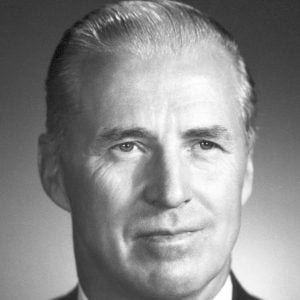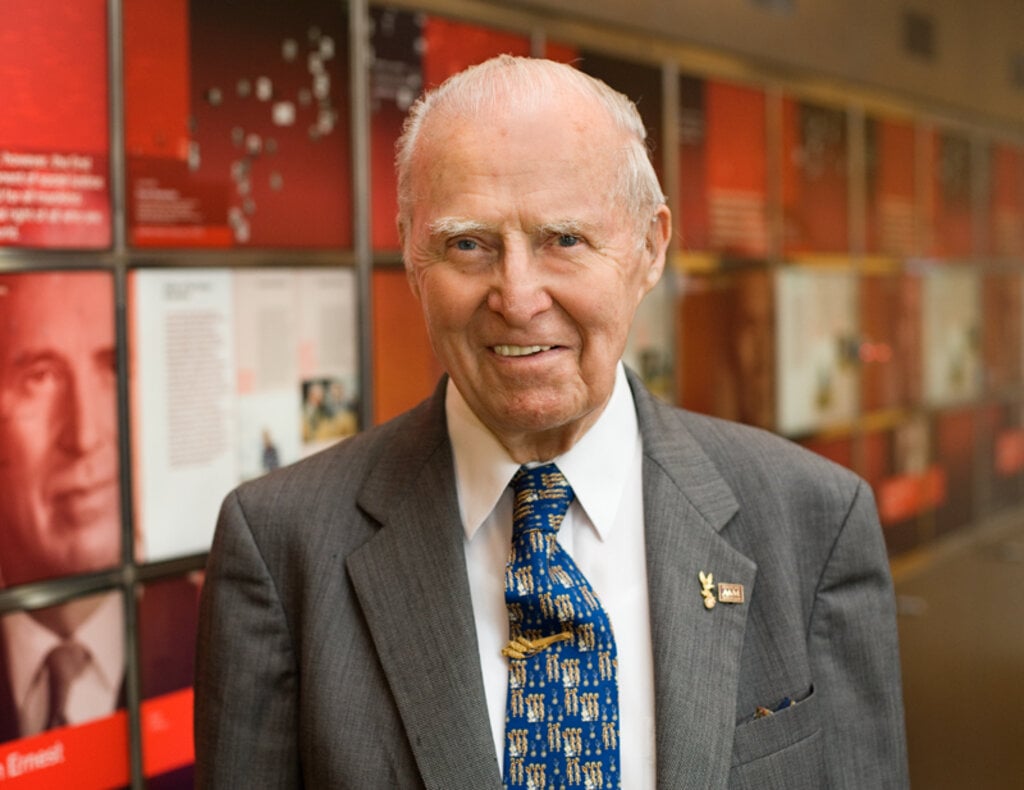Norman Borlaug
Speed read
Norman Borlaug was awarded the Nobel Peace Prize for his contribution to increasing food supply worldwide through the Green Revolution.

Full name: Norman Ernest Borlaug
Born: 25 March 1914, Cresco, IA, USA
Died: 12 September 2009, Dallas, TX, USA
Date awarded: 20 October 1970
Father of the Green Revolution
In the 1940s and 50s, agricultural scientist and plant pathologist Norman Borlaug worked in Mexico on a research program seeking to enhance Mexico’s self-sufficiency in grain production. Borlaug promoted better cultivation methods and developed a robust wheat strain – “dwarf wheat” – adapted to conditions in Mexico. By 1956 the country was producing enough wheat to feed its population. Borlaug’s success made him a sought-after adviser. In the 1960s he introduced dwarf wheat strains to India and Pakistan, leading to a dramatic rise in wheat production. Borlaug became known as leader of the “Green Revolution,” but he always insisted that he worked as part of a team, saying he could not have made such advances alone. Borlaug was an advocate of birth control as a means of balancing population growth with worldwide food production.
”In this intolerable situation, with the menace of doomsday hanging over us, Dr. Borlaug comes onto the stage and cuts the Gordian knot. He has given us a well-founded hope, an alternative of peace and of life – the green revolution.”
Aase Lionæs, Chairman of the Nobel Committee, Presentation Speech, 10 December 1970.
The Green Revolution
When Borlaug arrived in Mexico in 1944, his goal was to breed a new strain of wheat adapted to local conditions and featuring a short, strong stalk. Borlaug built research stations in the lowlands and at higher altitudes. He crossed a variety of wheat strains and finally succeeded in developing a new grain – dwarf wheat – that was viable in areas between the equator and the 40th parallel. In 1956 Mexico became self-sufficient in wheat production for the first time, and the success continued. Borlaug’s efforts during the severe food shortage in India and Pakistan in the 1960s led to a dramatic increase in wheat production. The Green Revolution had become a reality.
”Almost certainly, however, the first essential component of social justice is adequate food for all mankind. Food is the moral right of all who are born into this world.”
Norman Borlaug, Nobel Lecture, 11 December 1970.
Academic butterflies
According to Norman Borlaug, scientific progress is predicated on teamwork, determination and perseverance. He believed that agricultural scientists should have clearly defined goals and not allow themselves to be sidetracked by details that pale in significance compared to the need to supply the world with food. Borlaug called such details “academic butterflies.” “Personally, I enjoy watching butterflies,” he said in a 1970 interview, “but I do not enjoy spending time chasing them when there are more important things to be done.”

The Congressional Gold Medal
Norman Borlaug worked tirelessly throughout his life to increase world food production. He continued to hold inspirational lectures right up until his death. On his 90th birthday, in 2004, he urged the world to increase its efforts and called for new research to create “a second Green Revolution” in Africa. Three years later the Nobel Prize laureate was honoured with a Congressional Gold Medal, the highest civilian honour an American can receive.
| Green Revolution First used as the title of a book written by peace laureate Norman Borlaug in 1968. Denotes the development of new, high-yield strains of grain, spearheaded by Borlaug. Later incorporated into popular usage in many parts of the world. |
Learn more
A central figure in the “green revolution”, Norman Ernest Borlaug was born on a farm near Cresco, Iowa, to Henry and Clara Borlaug ...
Disclaimer: Every effort has been made by the publisher to credit organisations and individuals with regard to the supply of photographs. Please notify the publishers regarding corrections.
Nobel Prizes and laureates
Six prizes were awarded for achievements that have conferred the greatest benefit to humankind. The 12 laureates' work and discoveries range from proteins' structures and machine learning to fighting for a world free of nuclear weapons.
See them all presented here.
